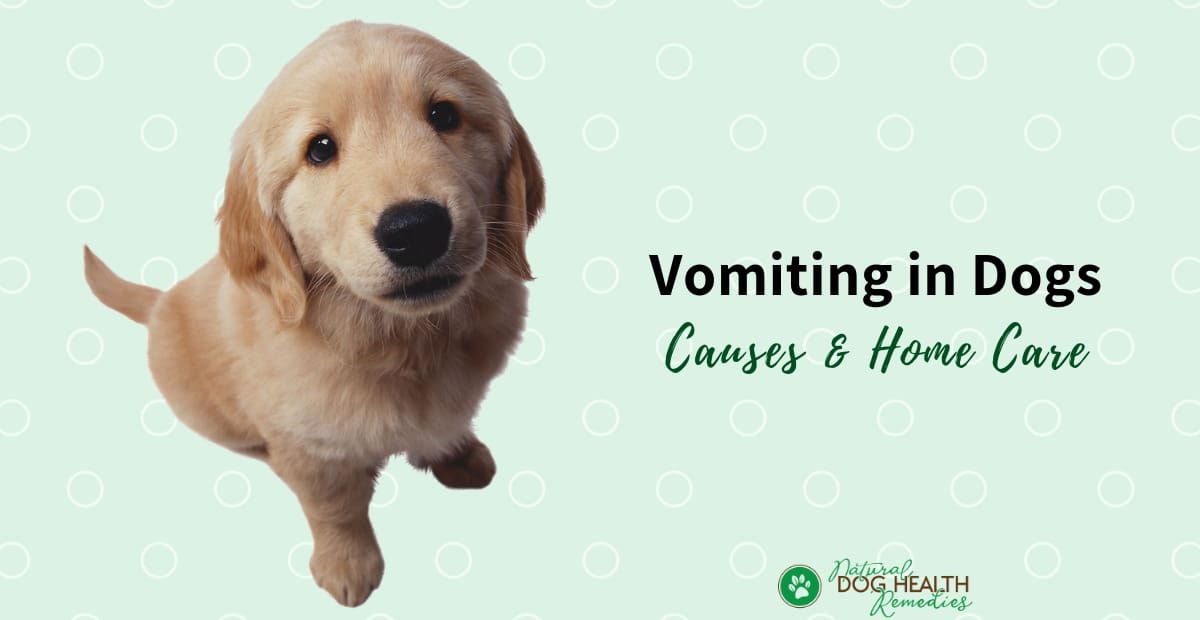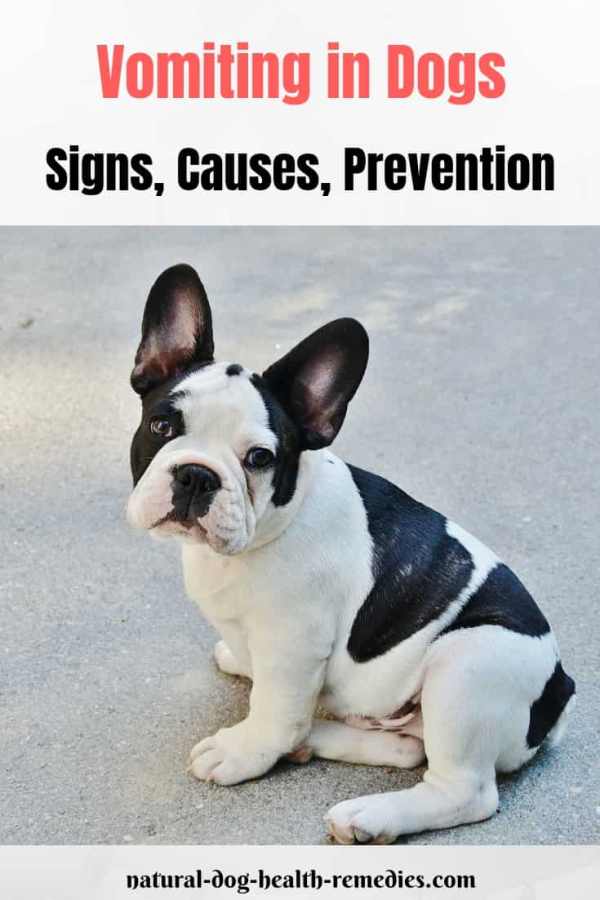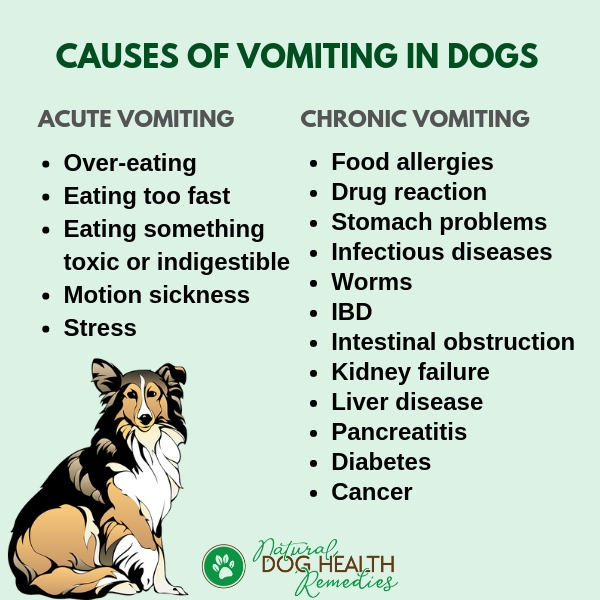Causes of Vomiting in Dogs

Overview
A dog vomiting could be a sign that shows the immune system's working hard to expel harmful foreign substances from the body.
If your dog vomits once in a while but does not show any other signs of health problems, there is probably nothing to worry about.
However, if your dog suddenly develops bouts of vomiting which don't seem to stop, or if the dog is suffering from chronic vomiting, a thoroughly examination is called for.
Signs of A Dog About To Vomit
So how do you know if your dog is going to throw up?
Watch out for these telltale signs:
One sign is that the dog tends to lick her mouth incessantly maybe because she drools before vomiting.
Another sign is you can see obvious contraction of the stomach muscles, very often accompanied by heaving, and sometimes gagging.
Even before any of these signs are showing, when my dog Hana feels like throwing up, she always comes to me with a "sick look" on her face and her tail is way down between her legs. Her body looks stiff - perhaps due to upset stomach. So if we are observant, we most likely can tell that a dog is going to vomit.
What Causes A Dog to Throw Up?
There are numerous reasons that may cause a dog to vomit.
Some causes for mild acute vomiting in dogs include:
- Over-eating
- Eating too fast
- Eating something indigestible or toxic
- Motion sickness
Some causes for chronic vomiting include:
- Food allergies
- Reaction to certain drugs (e.g. (e.g. chemotherapy drugs, NSAIDs, steroids, antibiotics, etc.)
- Stomach problems (e.g. gastritis, stomach ulcer)
- Infectious diseases (e.g. parvovirus, distemper)
- Worm infestation
- Inflammatory bowel disease
- Intestinal obstructions
- Liver disease
- Pancreatitis
- Cancer, such as stomach cancer, and intestinal cancer
Besides problems in the digestive system, health problems in other parts of the body may also cause vomiting in dogs, such as:
- Peritonitis (infection in the abdominal cavity)
- Hepatitis
- Kidney failure
- Hormonal imbalance (e.g. Addison's disease, Diabetes Mellitus)
In addition, sometimes a dog throws up not because of something wrong physically, but simply because of stress, or anxiety. This happens quite often to puppies. Very often, anxiety- or stress-related vomiting is accompanied by diarrhea.
When to See a Vet?
If your dog suffers from chronic vomiting, or if she shows any of the following symptoms, take her to the veterinarian right away:
- If the dog is vomiting more than 2-4 times a day.
- If the vomit is foamy.
- If there is blood in the vomitus.
- If the vomitus is foul-smelling.
- If the dog is weak or dehydrated*.
- If the dog's belly is bloated.
- If the dog is restless or panting, or seems to be in pain.
- If the dog has a fever.
*To check for dehydration, pick up some skin on the back of your dog and let it drop. If the skin does not return to its original position immediately, it means dehydration.
What Will the Vet Do?
The vet will observe your dog and ask you some questions, such as:
- When did the vomiting start?
- Did the dog vomit food or just bile?
- Was the dog gagging or retching with no substances?
- Has there been a recent dietary change?
- Have you fed your dog fatty foods or table scraps?
- Have there been recent environmental changes, e.g. have pesticides or herbicides been used in the yard? Is there a possibility that the dog has ingested rat poison, or some plants that may be poisonous to dogs?
- Any changes in the dog's environment that may have caused the dog stress or anxiety?
Your vet may also suggest doing some diagnostic tests to find out the underlying cause of vomiting. These tests may include:
- An abdominal x-ray - to see if there is intestinal obstruction or bloat.
- Blood work - to rule out poisoning, kidney or liver diseases, or pancreatitis, etc.
- Fecal sample - to check for intestinal parasites.
Managing a Vomiting Dog
 If your dog has mild, acute vomiting but is otherwise fine, try fasting her for 24 hours.
If your dog has mild, acute vomiting but is otherwise fine, try fasting her for 24 hours.
After 4 to 8 hours of fasting, you can give her some broth.
If she can keep the broth down, offer her a bit more food after another 8 hours. You can add a bit of well-cooked meat, and some well-cooked grains such as oatmeal or rice to the broth.
If your dog starts vomiting again, resume just feeding her broth for another 12 hours or so and try again.
If your dog is suffering from chronic vomiting, it is essential that you take her to the vet for a thoroughly check-up to find out the underlying cause.
Some Ways to Prevent Vomiting in Dogs
Depending on the cause of vomiting, here are some measures that can be taken to prevent vomiting in your dog:
- If your dog often vomits in the morning or before eating and the expelled substance is a clear yellow or brownish fluid, it may mean that she has an upset stomach caused by excessive stomach acids. Feeding your dog more frequent meals in smaller portions may solve the problem.
- If you feed your dog once a day, and your dog gulps down the food very fast because she is hungry, it is more likely that she will vomit after eating. Try feeding her several smaller meals - she may feel less hunger and may eat slower.
- As anxiety is a cause for vomiting in dogs, make sure that your dog has no stress or anxiety in her life! For example, many dogs feel threatened and experience anxiety if they have to eat in the presence of other dogs. Therefore, letting your dog enjoy her meals in a quiet, non-threatening environment can remedy this vomiting cause.
Natural Remedies for Dog Vomiting
Herbal and homeopathic remedies can be used effectively in treating vomiting in dogs. Please visit this page for more information.

 References
References
Eldredge, et al. Dog Owner's Home Veterinary Handbook 4th edition (Wiley Publishing, 2007).
M. Goldstein, The Nature of Animal Healing (Ballantine Books, 2000).
R.H. Pitcairn, The Complete Guide to Natural Health for Dogs and Cats (Rodale, 2005).





